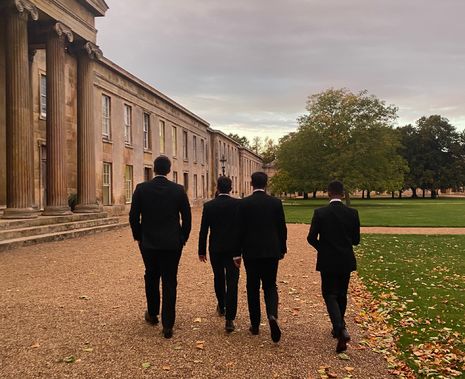‘I wasn’t ready to leave Cambridge’: Why finalists stay for a postgrad
Varsity asks why students stay at Cambridge for postgraduate study

Pre-emptive nostalgia is a peculiar feeling. In my first year, my friends and I used to go for long walks along the backs just to take pictures of King’s as the sun went down. Everything — the bridges, the old high walls, the statues with their muted faces — was intensely present, but the experience was dreamlike. By second year, the wide-eyed wanderings stopped, and Cambridge sank into the background of my life. I still knew the city was beautiful, but familiarity stole its vividness. Now, in my third year, the feeling is back. This time, it’s tinged with the particular kind of sadness that only comes with an awareness of time running out.
“You know, Cambridge doesn’t dissolve when you graduate”
In a meeting with my Director of Studies in Michaelmas, I tentatively enquired about the possibility of staying for a Masters. He was onto me in seconds. “Alice, the course you’re talking about doesn’t really align with your interests.” Then, with a slight smile. “You know, Cambridge doesn’t dissolve when you graduate. And a Master’s is quite a different experience — it’s not just an extension of your undergraduate years.” Incisive. I’d always thought that by the end of my three years here I’d be ready to try something different, but he was right.
Yet there are plenty of people who do both their undergraduate degrees and a (non-integrated) Master’s here at Cambridge, sometimes even at the same College. I set out to discover whether my DoS had stumbled upon a common trope — the finalist, fed up with being mistaken for a tourist while staring wide-eyed at the Mathematical Bridge, and staving off the nostalgia by settling down for one more year.
The first student I spoke to moved from an undergraduate degree to an MPhil in the same subject, sociology: “I applied for a few panic Master’s at other places when I realised I had no idea what I wanted to do with my life, but secretly I was always hoping they would let me stay here.” Was staying worth it? Apparently, it can be. “Last year I wasn’t ready to leave Cambridge. The thought would actually make me really anxious. Now, I’m looking forward to graduating and entering the world of work.”
The next person I spoke to, who stayed for an MPhil in History, was more reticent. “For staying here to actually be the safer or better option, you have to really enjoy your subject. If you’re not happy academically at Cambridge, you’re not happy.” It’s true that admissions staff, as my own example shows, are well-trained in uncovering the motivations of prospective students. “I can’t see any academic here agreeing to let someone on a course just because they don’t want to leave.”
“If you’re not happy academically at Cambridge, you’re not happy”
Indeed, most people were adamant about their love of their subject and course. For one applicant to African Studies MPhil, the decision was simple. “I looked around, and Cambridge presented the best option for me academically.”
A current MPhil student stressed the difference between undergraduate and postgraduate life. “What I do now is research-based and very self-led, so it feels more like a job.” The transition, they agreed, is slightly easier than going to another place, but it’s hard to break old habits when there’s no clear break between your undergraduate and postgraduate studies.
Applying to stay at Cambridge for a Master’s could prove less stressful than applying to a different university. One History student I spoke to had a brilliant idea for a thesis, emailed one of her current supervisors about it, and had a place as a student within a week. Knowing the right people doesn’t hurt — one applicant for a STEM MPhil thought that having their references written by academics known to admissions staff gave them a better chance of getting in.
But familiarity can be a double-edged sword. A Geography student pointed out that his supervisors were aware of the “many, many times” he had asked for extensions over the past two years. An applicant for the International Development Master’s, currently studying Politics and Sociology, expressed concern that their political differences with their Director of Studies would impede their chances of a place. One Bio Natsci actively chose to downplay their current student status in an interview for a Masters course, concerned it would make them look “arrogant”.
What about the social scene? The Geography student put the dilemma well. “I think there could be a sense of getting ‘left-behind’ if I’m still here and most of my friends have started their careers. But I see further study as equally valuable to a paid job.” A common theme emerged when I brought up social life – horror stories about freshers week. “I know that postgrads have their own scene socially, through MCRs and specific societies,” said one English student, “but it’ll be nice to know a few people, and to not be stumbling around lost trying to find the library again.”
Unsurprisingly, I get the sense that most people don’t pursue further study at Cambridge on a nostalgic whim. As for me — well, my first coursework deadline is coming up in a week, and graduation day is already starting to look way more attractive.
 News / Cambridge students set up encampment calling for Israel divestment6 May 2024
News / Cambridge students set up encampment calling for Israel divestment6 May 2024 News / Cambridge postgrad re-elected as City councillor4 May 2024
News / Cambridge postgrad re-elected as City councillor4 May 2024 News / Some supervisors’ effective pay rate £3 below living wage, new report finds5 May 2024
News / Some supervisors’ effective pay rate £3 below living wage, new report finds5 May 2024 Fashion / Class and closeted identities: how do fits fit into our cultures?6 May 2024
Fashion / Class and closeted identities: how do fits fit into our cultures?6 May 2024 Features / Cambridge punters: historians, entertainers or artistes? 7 May 2024
Features / Cambridge punters: historians, entertainers or artistes? 7 May 2024






